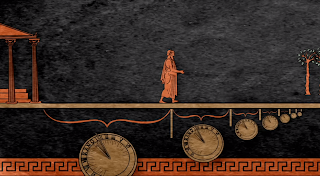This has the dual benefit of being both a nice introduction to questioning dogmas and a nice exercise in critical thinking: since the students are convinced beyond a shadow of a doubt that Zeno is wrong, they concoct all kinds of arguments to refute him. The problem, of course, is that it's notoriously difficult to explain why exactly he's wrong, where he's made some kind of mistake.
Now, I get the idea of a limit in calculus, and I get the idea of the sum of a series as opposed to the sum of the individual members of a series, but I have noticed that we seem to have such an aversion to Zeno's conclusions that even professional philosophers and mathematicians tend to engage in a kind of prestidigitation in which they explain a mathematical method for solving the paradox that ends up being more smoke and mirrors than a genuine solution. The problem, and the following animation is an example of this, is that they tend to frame the paradox in a way that's question-begging, one in which they assume motion in order to prove motion.
In the following animation, it seems clear how you can refute Zeno once you grant him motion to the first halfway point, but for Zeno, he wasn't willing to concede actually having crossed that halfway point. For him, the challenge is that BEFORE you reach that halfway point, you must reach the halfway point of that halfway point, and before you can do that, you must reach that other halfway point, lather, rinse, repeat ad infinitum, and Zeno's conclusion is that you NEVER actually get to leave the starting point: you haven't gone anywhere.
As you can see, if you don't grant any motion at all to begin with, the above explanation, nice as it is, doesn't quite do the trick, does it?
When trying to refute someone, you should always ask how that person might respond to your objections, and if you're charitable, right or wrong, that will give you a better sense of the real strength of your own arguments. When it comes to Zeno, I tend to think that if you were to explain to him the asymptotic concept of a limit in calculus, he could just apply his paradox to that and be right back in business with his own paradox, now fortified with steroids...















0 comments:
Post a Comment